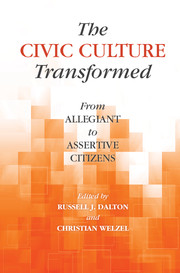Book contents
- Frontmatter
- Dedication
- Contents
- List of Figures
- List of Tables
- Contributors
- Foreword
- Preface and Acknowledgments
- 1 Political Culture and Value Change
- Part A Changing Values
- Part B Changing Images of Government
- Part C The Impact of Cultural Change
- 8 The Structure and Sources of Global Environmental Attitudes
- 9 Social Change and the Politics of Protest1
- 10 Mecca or Oil?
- 11 Allegiance Eroding
- 12 From Allegiant to Assertive Citizens
- References
- Index
8 - The Structure and Sources of Global Environmental Attitudes
Published online by Cambridge University Press: 05 January 2015
- Frontmatter
- Dedication
- Contents
- List of Figures
- List of Tables
- Contributors
- Foreword
- Preface and Acknowledgments
- 1 Political Culture and Value Change
- Part A Changing Values
- Part B Changing Images of Government
- Part C The Impact of Cultural Change
- 8 The Structure and Sources of Global Environmental Attitudes
- 9 Social Change and the Politics of Protest1
- 10 Mecca or Oil?
- 11 Allegiance Eroding
- 12 From Allegiant to Assertive Citizens
- References
- Index
Summary
Across the world, environmental concerns deepen. Citizens across a broad swath of nations – from affluent Germany and the Netherlands to publics in lesser affluent countries like Ghana and Vietnam – express unease about pollution problems. What explains this global concern with environmental issues?
We hope to contribute an answer to this question by examining the structure and sources of environmental concerns. First, we compare the attitudinal structure across the globe. Here we address the question of whether environmental attitudes occupy a comparable position in the minds of publics across diverse countries. Is environmentalism connected to economic views outside Western countries, as one might speculate on the basis of the prior literature? Or do environmental and economic views constitute separate dimensions everywhere? The theoretical relevance and the political implications of environmentalism partly depend on an answer to this question. For example, if environmental views are independent from economic orientations, it would make environmental demands more difficult to satisfy by policy changes limited to the economic realm. It would also increase the stability of these orientations and provide fertile ground for entrepreneurial activists to found groups and parties to translate these orientations into political action.
Then, in a second step, we model the attitudinal and contextual sources of environmental concerns. Here we step into a debate in the literature about the relationship between postmaterialism and environmentalism as a possible example of the cultural changes described in this book.
- Type
- Chapter
- Information
- The Civic Culture TransformedFrom Allegiant to Assertive Citizens, pp. 193 - 212Publisher: Cambridge University PressPrint publication year: 2014
- 7
- Cited by



